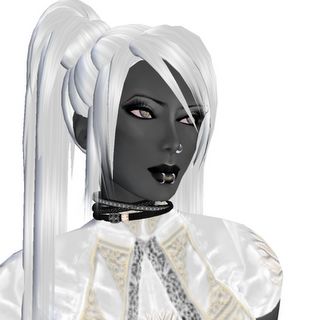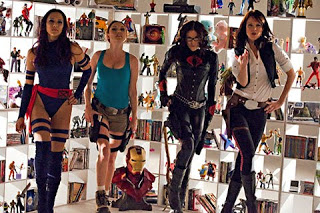 If you’re reading this, you probably know what a drow is too.
If you’re reading this, you probably know what a drow is too.
Now, I don’t say this to slam them. Not at all. Our culture tells us that women who aren’t ugly shouldn’t have deep interests of any sort. Yes, my friends, I am prepared for the shit storm that sentence is going to cause. But look at which geek girls are being targeted as panderers and betrayers of their sex. There are posts about how women who cosplay as Slave Leia or characters with any sort of sex appeal shouldn’t be taken seriously. (Read Bonnie Burton’s fantastic post on SFX about this.) There are posts about how hot, famous chicks couldn’t possibly be into geek stuff. They’re just talking about it to get guys to think they’re cool. (Oh my, how the worm has turned.)
 As Bonnie Burton said, Slave Leia strangled Jabba all by herself … in a metal bikini. Hardly a weak woman.
As Bonnie Burton said, Slave Leia strangled Jabba all by herself … in a metal bikini. Hardly a weak woman.
Now, this reminds me of a few of my feminist friends … and yes, I proudly identify myself as a feminist … back in college who told me I couldn’t be a feminist and wear makeup/be a makeup artist/do my hair/care about my appearance, etc. As though being attractive disqualifies you from being smart or caring about anything. Of cooourse. Attractive women don’t have to have interests. People give them things as soon as they bat their painted lashes. Interests and hobbies are for people who don’t have social lives or mascara, and have to occupy their hours with comic books because no one will talk to them. Apparently you don’t count as a feminist/geek if you fall into that category.

It’s not a stereotype that will disappear any time soon. And it does exist for a reason. I’m not saying no one out there has ever pandered or used liking something to look cool/get guys/land jobs. But I’m sorry, I can decorate my face and still want equal pay for equal work. I can talk about having boobs (I’m sure you read the post where amazing blogger Jill Pantozzi was called out for naming her blog Has Boobs, Reads Comics) and dress in sexy costumes and still be able to talk about comics and video games with conviction.

So where does that leave us? Well, there is very little we can do about the guys and what they say or think, other than to continue to have the conversation. But there is something we can do about our own community from the inside. We can support each other. We don’t need to be tearing each other apart from within. Calling each other out for names of blogs and threatening to punch a fellow geek in “her stupid boobs” is not helping. Telling someone that the way I’m a geek is far more legitimate than the way you’re a geek isn’t either.
Something that I mentioned on the ComiCenter podcast is the difference between geeks. There are the exclusionary geeks who say, ”I know this really cool thing about Batman and you’re an idiot because you don’t,” and the more welcoming sort who say, ”I know this really cool thing about Batman. Do you want to know too? That way we can geek out together.” I’m hoping we’re moving towards the second sort. Maybe we stop judging those who might have just entered the world of comics because of Iron Man or Thor, or just readWatchmen for the first time. They can be just as excited as those who read it years ago. Or those who didn’t start playing video games with Pong. Are they less legit because they’re new? Do you remember the first time you read The Lord of the Rings? The wonder you felt? It is possible to feel the same thing, even if you only read it after the trilogy came out.
So this is what we do. We support all types of geeks. We welcome new ones to our ranks. We stay vocal about what we love and support films/TV shows/blogs that reflect our interests. And we geek out in any way we want, whether that means auditioning for geek shows, playing with plastic lightsabers, tattooing our arms with geek symbols, posting in the Facebook group the League of Extraordinary Ladies, dressing up as either Slave Leia or Senator Leia and not judging either way, using our extensive knowledge of Middle Earth to impress a guy (no, that does NOT make you less legitimate), carrying our dogeared copies of Dragonsong proudly on the subway, tweeting the Daffy Duck version of the Green Lantern oath … be proud and loud about your geekiness, ladies. We are everywhere.

There is truth to the cliche that attractive people are more social, outgoing, and have more opportunity for activities outside of reading, studying, and gaming. That’s not to say just because you’re attractive you can’t have an interest in, and childhood memories of fantasy, sci-fi, and video games. It’s just that in my own experience not being “cool” or a jock left me with A LOT of time on my hands. I WISHED I was cool, I WANTED to be invited to parties and I would have spent WAY less time dreaming and losing myself in books and fantasies if I had been. I had friends and I WAS social… with other geeks, hence the cliche. I even had girlfriends, they were attractive to me… and “cool” in a different way, they just weren’t the “prom queen”.
So the “unicorn” isn’t a female geek/gamer but rather an “attractive” (ie HOT) one. Here’s the twist, since the turn of the millennia and the unstoppable wave of mobile multi-media and on-line social revolution and viral popularity in Hollywood blockbuster fantasy/sci/comic movies and conventions, the geek/gamer culture is now creeping fingers into all levels of social hierarchy. Now geek/gamer is a bragging right and cool. AND anything that’s cool, attractive people will gravitate towards.
Unicorns are becoming Zebra’s
First, I like unicorns. I just don’t like being referred to as one, because it causes me to think of the whole “purity; will only attract beautiful virgin girls” kind of thing. It’s been a long time since I was a virgin, but I still love unicorns and hope that if I run into them one day they won’t reject me, they’ll let me pet them. 🙂
As far as the whole “geek” label, it’s just a way for society to compartmentalize us, once again, into something that makes sense to them. That’s okay; everybody needs to makes sense of their own world. I make sense of mine by expanding my mind, staying open to new experiences, being accepting of others’ chosen lifestyles, and accepting people for what they came into the world with, even if it isn’t always palatable for me. It’s called tolerance.
I grew up playing pong, simon, Atari, then the arcade games like Pole Position and Pac Man; now I play PC games, xbox 360, PS3, and DS games. It doesn’t make me more or less a geek than the 12 year olds that are entering the fantasy adventure worlds adults love for the first time. I believe it is our job to lead them and guide them on their quest for better stories, and to enrich their lives with the best that the “geek” world has to offer.
Being a geek is only a small part of who I am as whole person. Being geeky is just your foot in the door of friendship with me. 🙂
So where does that leave us? Well, there is very little we can do about the guys and what they say or think, other than to continue to have the conversation.
You’re right, but I think it goes beyond “the guys.” As you related elsewhere, the businesses connected to the fandoms we geeks follow have been pushing the Geek Girls as Unicorns myth for decades – to the point where even their own employees have bought into it, it seems. There was a story in Newsweek awhile back asserting that at most of the early Star Trek conventions, the majority of the fan were women.
Our culture tells us that women who aren’t ugly shouldn’t have deep interests of any sort.
Well, there’s also the question of which body types are held up as not being “ugly,” which is problematic in a different way. The “Unicorn” tag isn’t just about rarity – it’s about exotification. One reason I think contributes to the “shitstorm”/backlash is that there’s a flip-side to what you’re describing: while geekdom for “standard” beauty-types and celebrities is framed so as to make them appealing, when somebody of a different body type is identified as a geek, it’s often in a prejorative light. To say nothing of the feelings of disenfranchisement that gamers/geeks of color or LGBT geeks have experienced over the years.
So this is what we do. We support all types of geeks.
The thing is, this support has to involve more than self-identification. If we’re gonna go to the wall for the celebrities and “pretty geeks” of the world, then we should be prepared to do the same for black geeks, latino geeks, LGBT geeks, as well. Go to their panel sessions at conventions. Visit the “safe space” websites and learn about their stories, then share those in the greater conversation.